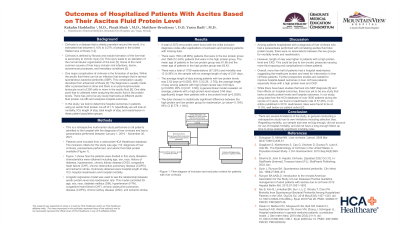Sunday Poster Session
Category: Liver
P1189 - Outcomes of Hospitalized Patients With Ascites Based on Their Ascites Fluid Protein Level
Sunday, October 27, 2024
3:30 PM - 7:00 PM ET
Location: Exhibit Hall E

Has Audio

Rakahn Haddadin, MD
MountainView Hospital
Las Vegas, NV
Presenting Author(s)
Rakahn Haddadin, MD, Pinak Shah, MD, Matthew Brockway, DO, Yasra Badi, MD
MountainView Hospital, Las Vegas, NV
Introduction: Liver cirrhosis is a significant health challenge globally, exerting a profound impact on healthcare. Complications arising from cirrhosis, notably ascites, hepatic encephalopathy, and variceal bleeding, necessitate extensive medical interventions and hospitalizations, exacerbating the burden on healthcare resources. Ascites, a common complication of cirrhosis, represents a potential pivotal aspect of disease management. We aim to highlight the relationship between ascites fluid protein levels and hospitalization outcomes.
Methods: Patients with a diagnosis of liver cirrhosis and an in-hospital paracentesis with ascitic fluid total protein level available were included in the study using retrospective chart review. Patients were stratified based on presence of low protein (≤ 1.5 g/dL) and high protein ( >1.5 g/dL). Mortality and readmission rates were analyzed using a logistic regression. Length of stay was assessed between the same groups using a linear regression.
Results: 3072 patients with a diagnosis of liver cirrhosis and an in-hospital paracentesis with ascites fluid total protein results were included in the study. Of these patients, 1504 (48.96%) had a low protein level and 1568 (51.04%) had a high protein level. Readmission happened in 1759 (57.22%) of all patients, with no significant difference between the two groups (p = 0.154). Patients with a high protein level ( >1.5 g/dl) had an increased length of stay, by 0.57 days, compared to patients with a low protein level (≤1.5 g/dl) (p=0.0269, 95% CI [0.065,1.066]) (Table 1). Patients not diagnosed with chronic kidney disease (CKD) had a length of stay 1.84 days shorter than patients diagnosed with CKD (p=0.0006). There was no significant difference in mortality between the two groups (p=0.8445).
Discussion: Among patients hospitalized with a diagnosis of liver cirrhosis who had a paracentesis performed with correlating ascites fluid total protein levels, we found no association between the two groups for mortality levels and readmission. However, length of stay was higher in patients with a high protein level and CKD. This could be due to low oncotic pressures causing more third-spacing and complications in these patients. Overall, more than half of patients had a hospital readmission, suggesting the healthcare burden and need for intervention in liver cirrhosis patients. Further prospective studies are needed to improve hospital-based outcomes in liver cirrhosis patients especially those with a high protein level and CKD.
Note: The table for this abstract can be viewed in the ePoster Gallery section of the ACG 2024 ePoster Site or in The American Journal of Gastroenterology's abstract supplement issue, both of which will be available starting October 27, 2024.
Disclosures:
Rakahn Haddadin, MD, Pinak Shah, MD, Matthew Brockway, DO, Yasra Badi, MD. P1189 - Outcomes of Hospitalized Patients With Ascites Based on Their Ascites Fluid Protein Level, ACG 2024 Annual Scientific Meeting Abstracts. Philadelphia, PA: American College of Gastroenterology.
MountainView Hospital, Las Vegas, NV
Introduction: Liver cirrhosis is a significant health challenge globally, exerting a profound impact on healthcare. Complications arising from cirrhosis, notably ascites, hepatic encephalopathy, and variceal bleeding, necessitate extensive medical interventions and hospitalizations, exacerbating the burden on healthcare resources. Ascites, a common complication of cirrhosis, represents a potential pivotal aspect of disease management. We aim to highlight the relationship between ascites fluid protein levels and hospitalization outcomes.
Methods: Patients with a diagnosis of liver cirrhosis and an in-hospital paracentesis with ascitic fluid total protein level available were included in the study using retrospective chart review. Patients were stratified based on presence of low protein (≤ 1.5 g/dL) and high protein ( >1.5 g/dL). Mortality and readmission rates were analyzed using a logistic regression. Length of stay was assessed between the same groups using a linear regression.
Results: 3072 patients with a diagnosis of liver cirrhosis and an in-hospital paracentesis with ascites fluid total protein results were included in the study. Of these patients, 1504 (48.96%) had a low protein level and 1568 (51.04%) had a high protein level. Readmission happened in 1759 (57.22%) of all patients, with no significant difference between the two groups (p = 0.154). Patients with a high protein level ( >1.5 g/dl) had an increased length of stay, by 0.57 days, compared to patients with a low protein level (≤1.5 g/dl) (p=0.0269, 95% CI [0.065,1.066]) (Table 1). Patients not diagnosed with chronic kidney disease (CKD) had a length of stay 1.84 days shorter than patients diagnosed with CKD (p=0.0006). There was no significant difference in mortality between the two groups (p=0.8445).
Discussion: Among patients hospitalized with a diagnosis of liver cirrhosis who had a paracentesis performed with correlating ascites fluid total protein levels, we found no association between the two groups for mortality levels and readmission. However, length of stay was higher in patients with a high protein level and CKD. This could be due to low oncotic pressures causing more third-spacing and complications in these patients. Overall, more than half of patients had a hospital readmission, suggesting the healthcare burden and need for intervention in liver cirrhosis patients. Further prospective studies are needed to improve hospital-based outcomes in liver cirrhosis patients especially those with a high protein level and CKD.
Note: The table for this abstract can be viewed in the ePoster Gallery section of the ACG 2024 ePoster Site or in The American Journal of Gastroenterology's abstract supplement issue, both of which will be available starting October 27, 2024.
Disclosures:
Rakahn Haddadin indicated no relevant financial relationships.
Pinak Shah indicated no relevant financial relationships.
Matthew Brockway indicated no relevant financial relationships.
Yasra Badi indicated no relevant financial relationships.
Rakahn Haddadin, MD, Pinak Shah, MD, Matthew Brockway, DO, Yasra Badi, MD. P1189 - Outcomes of Hospitalized Patients With Ascites Based on Their Ascites Fluid Protein Level, ACG 2024 Annual Scientific Meeting Abstracts. Philadelphia, PA: American College of Gastroenterology.
